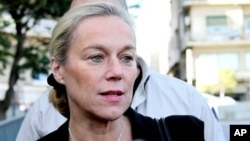UNITED NATIONS —
The international special coordinator overseeing the removal and destruction of Syria’s chemical weapons said Wednesday that despite insecurity, she hopes to meet the mission’s deadline of the end of June.
Sigrid Kaag briefed the U.N. Security Council in a closed session on progress as well as logistical and security challenges, confirming that the first quantity of chemical materials was loaded onto a Danish ship Tuesday at the Syrian port of Latakia for destruction outside the country.
“This movement is very important, as it is a first important step in an expected process of continued movement for the onward destruction out of country,” she said.
The joint mission of the United Nations and the Organization for the Prohibition of Chemical Weapons (OPCW) has struggled with some setbacks, including bad weather and a volatile security situation, putting it slightly behind schedule. Asked if the mission could still meet its end of June deadline for destroying all of Syria’s chemical weapons, Kaag was cautiously optimistic.
“I didn’t say we are on schedule, but what we talked about is a collective expectation by the Security Council" that there is no reason to assume delays would occur," she said. "All things being equal, we also have to remember Syria is a country at war; [the] security situation can shift from day to day."
The mission is moving into its third phase of activities, the destruction of chemical agents, which is to be completed by the end of June.
The mission is moving into its third phase of activities, the destruction of chemical agents, which is to be completed by the end of June.
The United States is providing technology for destroying the chemicals aboard a U.S. ship, as well as 3,000 container drums, GPS trackers, and equipment to facilitate loading, transportation and decontamination of the chemicals.
The Syrian government is responsible for the safe packaging and loading of the chemicals onto Danish and Norwegian ships which will carry the cargo to the U.S. ship. The chemicals will then be destroyed at sea.
In September, the U.N. Security Council demanded the destruction of Syria’s chemical weapons arsenal after Western countries blamed the government for an August 21 poison gas attack that killed some 1,400 people near Damascus.




